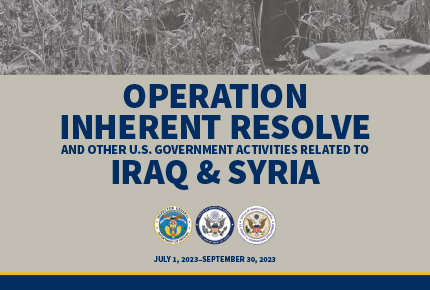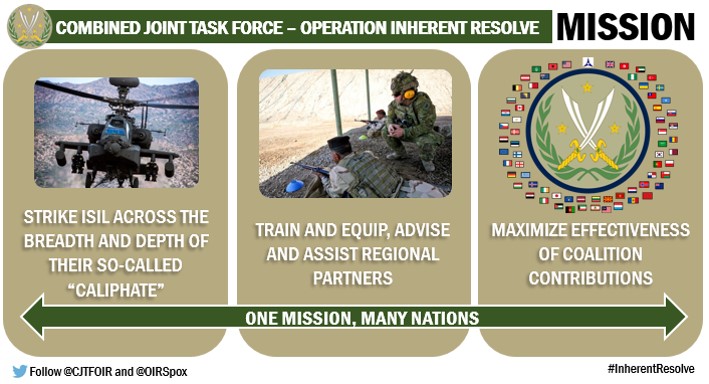Lead Inspector General for Operation Inherent Resolve I Quarterly Report to the United States Congress I July 1, 2023 - September 30, 2023
ISIS capabilities remained degraded and the group operated in survival mode in Iraq and Syria, with an ongoing loss of leadership and revenue. ISIS attack numbers continued to decline, and become less sophisticated and complex. However, ISIS seeks to resurge and recruit from vulnerable communities, particularly through indoctrination and training of youth from al-Hol and other displaced persons camps in Syria, while also seeking to free detainees from detention facilities.
Iraqi Security Forces (ISF) continued to improve some capabilities, while key deficits persist, including rotary wing readiness and Kurdish Security Forces (KSF) reform. During the quarter, the ISF continued to experience deficits in mission planning, intelligence, artillery, and logistics capability. However, the Iraqi operations center successfully integrated tactical air controllers, which should expand the ISF’s ability to independently conduct airstrikes.10 In the Iraqi Kurdistan Region (IKR), ongoing efforts to unify Kurdish forces under the Kurdish Ministry of Peshmerga Affairs (MoPA) slowed due to an ongoing political divide between the IKR’s two main political parties.
Clashes between local Arab forces and the Kurdish-led Syrian Democratic Forces (SDF) prompted concerns that ISIS could exploit the situation. During the quarter, the SDF completed an assessment of security levels at SDF detention facilities holding ISIS detainees.15 U.S. Special Forces continued to train guards for SDF detention facilities and security forces for the al-Hol camp. Conditions in the camp, while improving due to security improvements and repatriations of residents to home countries or communities, continued to pose a challenge for local security and humanitarian partners.
Other forces operating in Iraq and Syria—particularly Iran, Türkiye, Russia, and the Syrian regime—increased Coalition force protection needs, distracted partner forces, and escalated the risk of further conflict. This included an ongoing threat from Iran against U.S. and Coalition forces; Turkish military strikes targeting SDF personnel in northern Syria and the IKR; and dangerous or harassing Russian aircraft activity in and around Coalition aircraft and bases. Iran and Iran-aligned forces in Iraq and Syria continued their pause on attacks against U.S. and Coalition forces, while Iran threatened to resume attacks on Kurdish-Iranian opposition groups in northern Iraq.
There was limited progress toward U.S. goals to improve governance, promote economic growth, and address humanitarian crises in Iraq and Syria. The Iraqi government began to implement its new budget—which includes increases to welfare payments, public sector salaries, and public sector jobs, in addition to infrastructure spending. USAID reported that tight bank liquidity in Iraq constrained organizations that it supports. In Syria, the U.S. Government continued to support areas affected by the February 2023 earthquake while addressing emerging challenges, such as rising food prices and the failure of a key water station in Hasakah governorate.
Lead IG and partner agencies completed three oversight reports related to OIR during the quarter, including on the DoD’s end-use monitoring of sensitive equipment given to the Iraqi government, on State’s management of cooperative agreements supporting
Refugee Resettlement Support Centers, and on State’s management and use of temporary structures at high-threat posts overseas.
The Inspector General Act of 1978 provides a mandate for the three Lead IG agencies—the DoD OIG, State OIG, and USAID OIG—to work together to develop and carry out joint, comprehensive, and strategic oversight. Each IG retains statutory independence, but together they apply their extensive regional experience and in-depth institutional knowledge to conduct whole-of-government oversight of these overseas contingency operations.




No comments:
Post a Comment